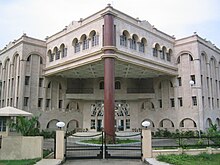National Law Universities (NLU) are public law schools in India, founded pursuant to the second-generation reforms for legal education sought to be implemented by the Bar Council of India.[1][2] The first NLU was the National Law School of India University aka NLS/NLU Bangalore which admitted its first batch in 1988. Since then, most of the states in India have NLUs. Currently there are 27 NLUs across the country out of which one is an off-centre campus of NLU Gandhinagar, GNLU SILVASSA Campus. Since the inception of NLUs, these law schools have continuously been ranked as India's most and world's one of the most prestigious and premier law schools by various agencies and are also referred as IITs of Legal Education.[3][4]
The admissions to these universities is conducted through the Common Law Admission Test (CLAT) except in the case of National Law University, Delhi, which admits students through its own entrance examination named as All India Law Entrance Test (AILET). NLU Meghalaya also has its own admission / entrance test it is anticipated that in the coming years AILET and NLU Meghalaya's separate tests will be merged into CLAT. Admission to the NLUs is extremely competitive with an acceptance rate as low as 2% to 3% in case of CLAT and approx 0.50% via AILET. CLAT which is also known as the main gateway to NLUs has been ranked as one of the top five toughest entrance examinations in India.
NLUs have Chief Justice of India (CJI) and various Chief Justices of Respective High Courts as their Chancellors and visiting professors. Many retired judges and bureaucrats are also here as permanent faculty and Vice-Chancellors.




- ^ "India's Top National Law Universities (NLUs)". www.lawentrance.com. Retrieved 18 June 2021.
- ^ "What are NLUs (National Law Universities)? How are these Different from Other Law Schools". www.shiksha.com. Retrieved 8 January 2022.
- ^ "India's Best Law Colleges 2019". India Today. Retrieved 28 March 2020.
- ^ "NIRF Law school ranking". National Institutional Ranking Framework. Ministry of Education, Government of India. 2023.
